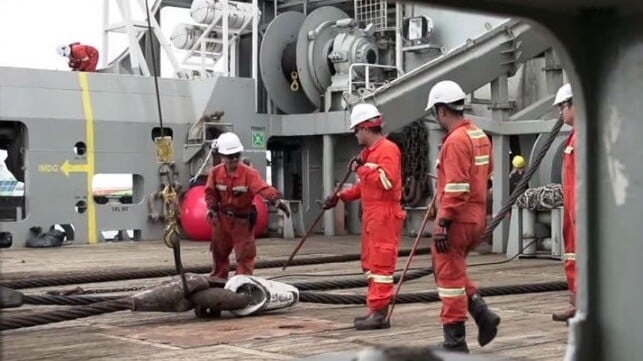Nearly a Third of Seafarers Still Face Illegal Demands for Recruiting Fees

New research revealed that there is little progress on the age-old problem of seafarers being solicited to pay “recruitment fees” despite this practice being illegal under the Maritime Labour Convention. The report says that seafarers are not only still paying the fees in 2024 but that they are often going into debt and that it results in stress that can lead to unsafe working conditions on board ships.
The practice is well known and the authors show there has been little progress. The report produced by The Institute for Human Rights and Business and Turtle, an ethical maritime requirement platform, highlights that nearly a third of the 2,672 seafarers interviewed this year said they had been asked to pay to get their jobs. In April 2023, the same organizations did a wider survey on corruption practices and found a third of seafarers had been asked to or had paid recruitment fees.
The authors believe there is not strong enough awareness among applicants to the illegality of the practice while many said they did not know how to report the incident. The most common demand is for cash with 73 percent of the people saying they were asked to pay money either in cash or a bank transfer.
A little over a third of the respondents said they paid less than $500 while nearly half said it was between $500 and $5,000. Eight percent said it was more than $5,000.
The authors of the report conclude this results in the seafarers “accumulating intolerable levels of debt in order to secure a position.” In the comments, many people told the survey that they had a monthly amount being deducted from their salary. However, the report says approximately seven percent of seafarers needed over five years to pay off debts.
The requests are being fairly evenly split between both officers and ratings. “This demonstrates that more senior rankings are just as likely to be asked to pay recruitment fees as lower ranks,” the report concludes.
“This illegal practice must end,” the report declares. The majority (62 percent) of the requests are coming from crewing or manning agents. This is followed by companies or individuals linked to the crewing agency or shipping company in 41 percent of the cases.
Nearly three-quarters (74 percent) of the requests are being paid they found that in only 20 percent of the cases where people were asked to pay was the incident reported. Of the respondents, 40 percent said they did not know how to report it and 37 percent said reporting “would make no difference.”
While pointing to the actions of groups including the International Transport Workers’ Federation (ITF), the Maritime Anti-Corruption Network (MACN), and charities including ISWAN and The Mission to Seafarers, they said the industry has more reasonability.
“There needs to be applied leadership and action from shipping companies, cargo owners, and government agencies to end this corrupt and illegal practice,” the groups write in the report.

that matters most
Get the latest maritime news delivered to your inbox daily.
They call for shipping companies to create opportunities for reporting incidents and providing channels to find a job without fees. Customers they say also have a responsibility while there also needs to be greater efforts to build awareness. They would also like to see possibly a mechanism for employers to reimburse seafarers who had paid the fees.
The report concludes that to make headway in eliminating the practice, there must be mechanisms to penalize the agencies and offenders charging the fees.
